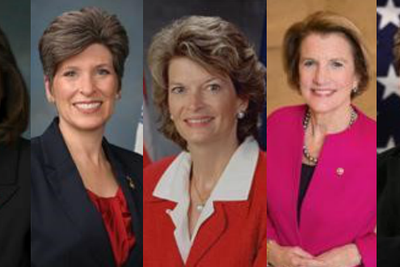WASHINGTON — The Senate passed a significant milestone this year: 21 of its members are now women, the highest number in American history. But as the recent wrangling over the American health care system in Congress shows, there isn't always power in numbers.
After the House passed a health care bill that gave states the option to drop pregnancy and maternity care from required insurance coverage, Republican leaders in the Senate seemed poised to answer criticism from women. Instead they courted more, naming a 13-member, all-Republican working group on health care legislation, without a single woman on it — forcing Senator Mitch McConnell of Kentucky, the majority leader who approved the panel, on the defensive on Tuesday.
"The working group that counts is all 52 of us," Mr. McConnell said unapologetically at a news conference, referring to the number of Republican senators. "Nobody is being excluded because of gender."
But Republican women have struggled to gain as much influence in the Senate as their Democratic counterparts. The reasons have as much to do with the partisan nature of health care legislation as with a longstanding problem that Republican women have had in being elected and gaining power in Congress.
Republicans currently control the health care debate through a process that excludes Democrats in both houses of Congress, and in that equation, women lose power. (Republicans need no Democrats to pass a health care bill in the Senate.) Women make up about a third of the Democratic caucus in Congress, while Republican women make up 10 percent of theirs. Among the 21 female senators, five are Republicans. The party lost ground last year when Senator Kelly Ayotte, a New Hampshire Republican, fell to Maggie Hassan, a Democrat.
One result is far fewer committee chairwomen than when Democrats controlled the Senate and women ran several powerful committees.
Only Senator Lisa Murkowski, Republican of Alaska, heads a standing committee, Energy and Natural Resources, while Senator Susan Collins, Republican of Maine — as a health care expert the most notable woman left off Mr. McConnell's health care team — is chairwoman of the Special Committee on Aging.
While the highest-ranking Democrat on the Senate Judiciary Committee is a woman — Dianne Feinstein of California — not a single Republican woman has ever served on the committee.
"What we are seeing now in stark relief is the tremendous disparity between the number of women serving in the two parties," said Debbie Walsh, director of the Center for American Women and Politics at Rutgers University. "Women are so underrepresented in the Republican conference that with Republicans controlling Congress, their numbers are so paltry they don't register in that power hierarchy."
Senate women pointed out that Senate leaders did not need to yield to seniority or critical mass, however, to pick members for the health care group. "The women of our conference are not afraid to have their voices heard," Ms. Collins said on Tuesday.
Ms. Collins gave a presentation on Maine's high-risk health care pools to her colleagues at a lunch on Tuesday, and is working on a Medicaid group with other women.
The exclusion of the women was so conspicuous that reporters raced to them like deer to a salt lick to question them on their feelings about being left out.
A reporter tried to talk to Senator Joni Ernst, Republican of Iowa, about the all-male panel as Ms. Ernst entered an elevator. "I do think people need to be qualified," Ms. Ernst said, but she was then intercepted by Senator Pat Roberts, Republican of Kansas, who stepped in front of her and announced "I have a date" as he shielded Ms. Ernst from the reporter.
Another Republican woman excluded is Senator Shelley Moore Capito, whose home state, West Virginia, expanded Medicaid through the Affordable Care Act but is struggling with an epidemic of opioid abuse.
Democrats deplored the all-male panel. "We are going to keep pushing Senate Republicans to take a different path than the House did and sending a very clear message to the 13 Republican men currently negotiating a secret health care plan," said Senator Patty Murray, a Washington Democrat who is among the longest-serving women in the Senate. "Which I really hope isn't happening in the men's locker room."
At a meeting of the health care working group on Tuesday, Republican senators discussed the future of Medicaid and in particular how to reduce the amount of money the federal government pays to states that have expanded Medicaid eligibility under the Affordable Care Act.
Conservatives seek a rapid scaling back of the federal financial commitment, while moderate Republicans seek a slower "glide path." The federal government pays at least 90 percent of costs for people who qualify for Medicaid because of the expansion of eligibility. By contrast, the federal government paid an average of 57 percent for people who were eligible under prior law.
This year is the centennial of women in Congress, and the House historian is holding a special exhibit of oral histories. An online version of the exhibit on the first women in Congress can be found as well.
###
May 1, 2017
Addendum.
1. On Healthcare, this sentence above is critical - Republicans need no Democrats to pass a health care bill in the Senate.
This means we need Republicans to vote against Trumpcare. Perhaps we can empower these GOP women Senators by encouraging them to say No, to Trumpcare. Have friends from their states call them too.
Lisa Murkowski. R-ALaska. Phone: (202)-224-6665
Joni Ernst. R-Iowa. Phone: (202) 224-3254
Susan Collins. R-Maine. Phone: (202)224-2523
Deb Fischer. R-Nebraska. Phone: (202) 224-6551
Shelley Caputo. R-West Virginia. (202) 224-6472
2. In response to the 217 RepublicanRepresentatives who voted for Trumpcare, the Indivisible Guide, Women's March, and the Townhall Project have created the Payback Project. The website is full of resources for holding these Reps accountable, understanding Trumpcare , and finding local events.
Join in, and make sure these GOP Reps know that their votes are not going unnoticed: https://www.paybackproject.org/
